Baptist Covenant Theology Collection (17 vols.)
Digital Logos Edition
Overview
The Baptist Covenant Theology Collection dives into seventeenth- and eighteenth-century covenant theology, emphasizing the implications God’s covenants with man have for modern-day believers, particularly regarding baptism. One of the largest divisions facing the Baptist church in the seventeenth century was the stance on paedobaptism. These texts carefully craft arguments from Scripture, drawing from developments in covenant theology to address contemporary arguments supporting infant baptism. The collection contains a blend of accessible texts written for laity and more in-depth scholarship for those wanting to dig into covenant theology.
With Logos Bible Software, these valuable volumes are enhanced by cutting-edge research tools. Scripture citations link directly to English translations, and important terms link to dictionaries, encyclopedias, and a wealth of other resources in your digital library. Powerful searches help you find exactly what you’re looking for. Tablet and mobile apps let you take the discussion with you. With Logos Bible Software, the most efficient and comprehensive research tools are in one place, so you get the most out of your study.

- Examines seventeenth- and eighteenth-century covenant theology
- Addresses contemporary paedobaptist arguments
- Provides a variety of accessible and scholarly explorations of Scripture
- Title: Baptist Covenant Theology Collection
- Volumes: 17
- Pages: 3,179
- The Ax Laid to the Root, Part 1 by Benjamin Keach
- The Ax Laid to the Root, Part 2 by Benjamin Keach
- The Display of Glorious Grace; or, The Covenant of Peace, Opened by Benjamin Keach
- The Everlasting Covenant: A Sweet Cordial for a Drooping Soul by Benjamin Keach
- A Discourse of the Covenants That God Made with Man before the Law by Nehemiah Coxe
- A Short Description of the Difference between the Bond-Woman and the Free, as They Are the Two Covenants, 2nd ed. by Isaac Backus
- A Treatise concerning the Lawful Subject of Baptism, 2nd ed. by John Spilsbery
- Truth Vindicated, in Several Branches thereof, and Many Objections Fairly and Soberly Answered
- A Just Reply to Mr. John Flavell’s Arguments, by Way of Answer to a Discourse by Cary Philip
- A Solemn Call by Cary Philip
- Baby-Baptism Meer Babism; or An Answer to Nobody by Samuel Fisher
- The Fallacy of Infants Baptisme Discovered; or, Five Arguments, to Prove That Infants Ought Not to Be Baptized by Paul Hobson
- A Treatise concerning the Covenant and Baptism: Dialogue-wise, between a Baptist & a Poedo-Baptist by Edward Hutchinson
- Of Baptisme by Henry Lawrence
- A Little Cabinet: Richly Stored with All Sorts of Heavenly Varieties, and Soul-Reviving Influences by Robert Purnell
- A Treatise of the Vanity of Childish-Baptisme: Wherein the Deficiency of the Baptisme of the Church of England is Considered in Five Particulars Thereof by Andrew Ritor
- The Second Part of the Vanity & Childishnes of Infants Baptisme by Andrew Ritor
This title is included in the following collections
You can save when you purchase this product as part of a collection.
Logos 7 Baptist Bronze Legacy ...
$89.99$89.99Logos 7 Baptist Silver Legacy ...
$349.99$349.99Logos 8 Baptist Gold Legacy Li...
$849.99$849.99Logos 7 Baptist Gold Legacy Li...
$849.99$849.99
- $849.99
- $1,499.99
- $1,499.99
- $1,499.99
- $2,999.99
- $2,999.99
- $2,999.99
- $4,749.99
- $4,749.99
- $4,749.99
- $21,749.99
- $24,999.99
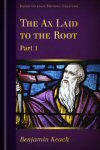
This volume contains two sermons on Matthew 3:10, expanding upon the metaphor and applying it to both infant baptism and church membership.
Benjamin Keach, in his laborious treatise, proves most practically what mines of truth lie concealed in the metaphors of Scripture.
Benjamin Keach (1640–1704) was an early Baptist (sometimes called Particular Baptist or Baptist Puritan) and a preacher at Horselydown church in London. His best-known works include The Baptist Catechism (also called Keach’s Catechism, although the work is so old that his authorship is debated) and A Key to Open Scripture Metaphors (also called Tropologia), as well as a hymnbook that provoked debate among early Baptists. His church was the first among the Baptists to sing hymns instead of psalms and paraphrases.
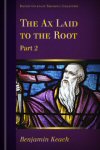
This volume contains the second part of Benjamin Keach’s work on Matthew 3:10. The text offers further exposition of the metaphor, a reply to a treatise on paedobaptism, and Keach’s reflections on the work of Joshua Exell.
Benjamin Keach (1640–1704) was an early Baptist (sometimes called Particular Baptist or Baptist Puritan) and a preacher at Horselydown church in London. His best-known works include The Baptist Catechism (also called Keach’s Catechism, although the work is so old that his authorship is debated) and A Key to Open Scripture Metaphors (also called Tropologia), as well as a hymnbook that provoked debate among early Baptists. His church was the first among the Baptists to sing hymns instead of psalms and paraphrases.
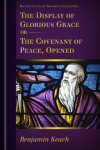
This volume contains 14 sermons by Benjamin Keach on the covenant of peace. Keach pays special attention to what he believed were the mistakes of his contemporaries regarding reconciliation and justification.
Benjamin Keach (1640–1704) was an early Baptist (sometimes called Particular Baptist or Baptist Puritan) and a preacher at Horselydown church in London. His best-known works include The Baptist Catechism (also called Keach’s Catechism, although the work is so old that his authorship is debated) and A Key to Open Scripture Metaphors (also called Tropologia), as well as a hymnbook that provoked debate among early Baptists. His church was the first among the Baptists to sing hymns instead of psalms and paraphrases.
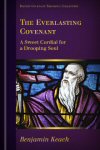
This volume contains a sermon by Benjamin Keach on the distinction between the covenant of redemption and the covenant of grace. Keach critiques the arguments supporting this distinction. The text also includes an elegy for Pastor Henry Forty, who passed away four days earlier.
Benjamin Keach (1640–1704) was an early Baptist (sometimes called Particular Baptist or Baptist Puritan) and a preacher at Horselydown church in London. His best-known works include The Baptist Catechism (also called Keach’s Catechism, although the work is so old that his authorship is debated) and A Key to Open Scripture Metaphors (also called Tropologia), as well as a hymnbook that provoked debate among early Baptists. His church was the first among the Baptists to sing hymns instead of psalms and paraphrases.
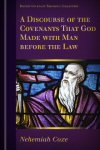
A Discourse of the Covenants That God Made with Man before the Law
- Author: Nehemiah Coxe
- Publisher: Nathaniel Ponder
- Publication Date: 1681
- Pages: 195
This volume presents an exposition on each of the covenants God made with man before the law, with particular attention to the covenant of circumcision. The text also discusses the argument for paedobaptism.
[Coxe is] that great divine, eminent for all manner of learning . . .
—C. M. du Veil, author, A Commentary on the Acts of the Apostles
Nehemiah Coxe (died 1688) was a pastor of the Bedford church, a physician, and a theologian, well versed in Greek, Latin, and Hebrew. His other work includes Vindiciae Veritatis, or a Confutation of the Heresies and Gross Errours Asserted by Thomas Collier.
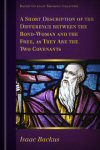
This volume contains Isaac Backus’ description of the bond-woman, the free woman, and the condition of each of their children. The text uses Scripture to break down the implications for believers, and provides a response to a letter concerning baptism.
Isaac Backus (1724–1806) was one of the most significant Baptist preachers during the American Revolution. Backus argued against state-established churches and was an original trustee in the charter for the College in the English Colony of Rhode Island and Providence Plantations, now known as Brown University. His most famous sermon was titled, “An Appeal to the Public for Religious Liberty, Against the Oppressions of the Present Day,” in which he claimed, “Now who can hear Christ declare, that his kingdom is, not of this world, and yet believe that this blending of church and state together can be pleasing to him?” His most important work is Government and Liberty Described and Ecclesiastical Tyranny Exposed.
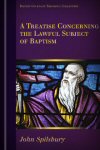
This volume presents John Spilsbury’s apologetic work on baptism. Spilsbury argues against the theology of paedobaptism, stating “that the spirituality of the new covenant in Christ eliminated the possibility of an infant’s participation in it.” The text examines the covenant God made with Abraham and his descendants, and suggests that “the covenant, and not baptism, forms the church, and the manner how.”
John Spilsbury (1593–c. 1668) was a Particular Baptist minister. In 1638, he established a Calvinist Baptist church in London. His other work includes God’s Ordinance, The Saints Privilege.
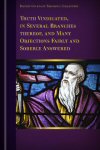
This volume presents a treatise on the covenants, establishing distinctions between the covenant of grace, the covenant God made with Abraham, and the covenant of works. The text also contains direct responses to objections raised by other scholars.
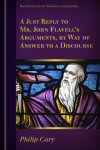
This volume contains Philip Cary’s response to arguments contained in a discourse by John Flavell. Cary suggests that the covenant made with Israel on Mount Sinai and the covenant of circumcision were editions of the covenant of works, and that they cannot provide an argument for paedobaptism. Cary also addresses the reflections of Joseph Whiston on the same discourse, and his response to the arguments of Nehemiah Coxe.
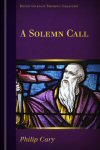
This volume contains Philip Cary’s discourse on baptism. Cary emphasizes paedobaptism, criticizing his contemporaries’ arguments, which supported the practice.
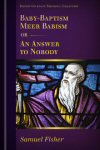
This volume is intended to provide an answer to those concerned with antidiabolism, antibabism, antirantism, antiranterism, and antisacedotism, addressing each of these concerns in detail.
Samuel Fisher (1605–1665) was an English Quaker and a popular preacher. He received his BA from Trinity College, Oxford, and his MA from New Inn Hall, Oxford. His other works include Christianismus Redivivus, Christ’ndom both Unchrist’ned and New-Christ’ned, The Scorned Quaker’s True and Honest Account, and The Burden of the Word of the Lord.
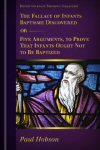
The Fallacy of Infants Baptisme Discovered; or, Five Arguments, to Prove That Infants Ought Not to Be Baptized
- Author: Paul Hobson
- Publication Date: 1645
- Pages: 15
This volume emerged from the private conversations of several Baptist ministers, and was published to reveal their findings on infant baptism to the public. This text presents five concise arguments against paedobaptism.
Paul Hobson (died 1666) was an antinomian Particular Baptist and captain in the parliamentary army in the English Civil War. He signed the Baptist Confession of 1644. He was also involved in the Farnley Wood Plot—a conspiracy to overturn the monarchy—which he was later arrested for.
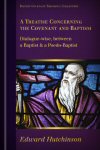
This volume contains Edward Hutchinson’s reflections on the covenant and baptism, presented in the form of a conversation between a Baptist and a Paedobaptist. The text is intended to provide an easily accessible presentation of the arguments, and ultimately to prove that Christians are only the spiritual seed of Abraham, and that the argument of the birth privilege is a fallacy.
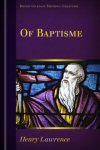
This volume examines the aspects of baptism—from the ceremony and its uses to the questions plaguing seventeenth-century theological discussions.
Henry Lawrence (1600–1664) was president of the English Council of State during Oliver Cromwell’s protectorate. He was educated at Queen’s College and Emmanuel College at Cambridge.
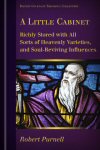
This volume seeks to provide a plain, methodical exposition of the building blocks of Christianity, and the ways they connect through God’s covenants with man. The text bases its claims on Scripture, and constructs a logical framework to move from one point to the next.
Robert Purnell (died 1666) was an elder of the First Baptist Church at Bristol. His other works include Good Tydings for Sinners, No Power But of God, The Way to Heaven Discovered, and The Way Step by Step to Sound and Saving Conversion.
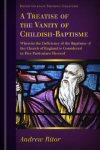
A Treatise of the Vanity of Childish-Baptisme: Wherein the Deficiency of the Baptisme of the Church of England is Considered in Five Particulars Thereof
- Author: Andrew Ritor
- Publication Date: 1642
- Pages: 32
This volume addresses the baptism of the Church of England, taking into consideration five particulars of Anglican baptism: the end for which, the manner in which, the power by which, the ground from which, and the subject on which it is performed.
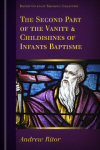
In this volume, Andrew Ritor follows up his examination of baptism in the Church of England with a study of Scriptures commonly used in defense of infant baptism. Ritor also explores the nature of the covenants God made with Abraham and his children.
Reviews
14 ratings
Thomas Brooks
10/31/2022

Jorge Rodriguez
8/16/2021

Daniel Caballero
3/20/2019

Mr. Youngblood
3/26/2016

PATRICK CARRAWAY
1/30/2016
AeliusCicero
8/7/2015

Pastor Rocky L. Carson
4/24/2015

Larry Proffitt (I
2/23/2015

Bill Shewmaker
2/18/2015